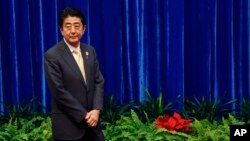Japanese Prime Minister Shinzo Abe will make a high-profile visit to the United States this week amid renewed scrutiny of his position on the aggressive policies Japan pursued when it was a colonial power in Asia, in the years leading up to World War Two.
Abe will meet with President Barack Obama at the White House on Tuesday, and he will address a joint meeting of the U.S. Congress, becoming the first Japanese government chief ever accorded such a privilege. The prime minister is expected to showcase Japan's strong alliance with the United States and to note the approaching 70th anniversary of the end of the war.
As for addressing his controversial views about Japan's colonial-era and wartime policies, Abe said he will not repeat the language of the Murayama Statement of 1995 - the 50th anniversary of the war's end - in which former Japanese leader Tomiichi Murayama apologized for the damage and suffering Japan inflicted on its Asian neighbors, and said that view was unanimously endorsed by his Cabinet.
Predecessors' apologies
Abe said the reconciliation that Japan sought 20 years ago has succeeded, and there is no need to revive the Murayama Statement. However, a group of U.S. lawmakers has called on him to “squarely face history” and reaffirm his predecessors' apologies for Japan's wartime aggression.
A Korean-American group in Washington also is urging Abe to apologize for its past abuses of "comfort women" - Koreans forced into sexual slavery by Japan’s imperial army during World War Two. The issue has long been a source of friction and tension between South Korea and Japan, but analysts are skeptical that any new statement will emerge during the prime minister's visit.
“The Abe administration is less interested than some previous Japanese governments in addressing or dealing with the comfort women and other World War Two historical issues," said Charles Armstrong, a professor of history at Columbia University who specializes in Korean studies, "so I would expect the U.S. and Japan to try to come to some sort of compromise statement on this.”
Shihoko Goto, the Wilson Center’s senior associate for northeast Asia, shared a similar forecast. “Whether Abe will indeed offer the kind of apology, a sense of remorse that will be acceptable to the Korean and Chinese side is still in question,” she said.
Some experts say they are concerned that Abe's comments could further strain bilateral relations between Tokyo and Seoul, and complicate the Obama administration’s security strategy in the region.
'Our closest allies'
“It’s important for the U.S. that Japan and South Korea get along because they are historically - and today, too - our two closest allies in the Pacific. If we are going to construct any security architecture in the Pacific, then we need all of the countries that are part of that architecture to work in unison when issues that are of critical strategic importance arise,” said Gregg Brazinsky, a professor at George Washington University.
Traveling in Asia earlier this month, U.S. Defense Secretary Ashton Carter acknowledged that close cooperation by the United States, Japan and South Korea is crucial to the U.S. effort to "rebalance" its relationship with the entire region.
“Enhancing trilateral security cooperation is a key element of America’s rebalance to the Asia-Pacific region,” Carter said in an interview with the Japanese national newspaper Yomiuri Shimbun.
Experts say there is a growing sense in the Obama administration that tensions between Tokyo and Seoul cannot be overlooked.
“I would anticipate the president emphasizing the importance of shared interest between Japan and South Korea, and encouraging the prime minister to find a way to move Japan" to resolve those tensions, said Nicholas Szechenyi, deputy director of the Japan chair at the Center for Strategic and International Studies (CSIS).
Delicate line
Washington is trying to walk a delicate line between its two allies by quietly pushing Tokyo to face history as previous governments have done, while encouraging both sides to work to end the dispute.
“We encourage Prime Minister Abe to constructively address historical issues consistent with Japan's past statements on these issues, and in fostering better cooperation on any tensions in the region,” Ben Rhodes, President Obama's deputy national security adviser, told reporters Friday.
Evan Medeiros, senior director for Asian affairs at the National Security Council, said “all sides should address history issues from the perspective of being constructive and focusing on the future, and reaching final resolutions.”
In contrast to historical disputes between Tokyo and Seoul, President Obama and Prime Minister Abe are expected to find a common ground when they discuss how to cope with threats posed by North Korea.
“I would expect very strong statements from both leaders criticizing North Korea’s nuclear and missile development, and possibly human rights as well,” Professor Armstrong said.
Goto agreed, saying, “I think there will be a broad agreement that they see eye-to-eye when it comes to the threat coming from North Korea.”
However, she noted the two leaders are not likely to disclose any specific steps they might take in the campaign to denuclearize the communist country.
